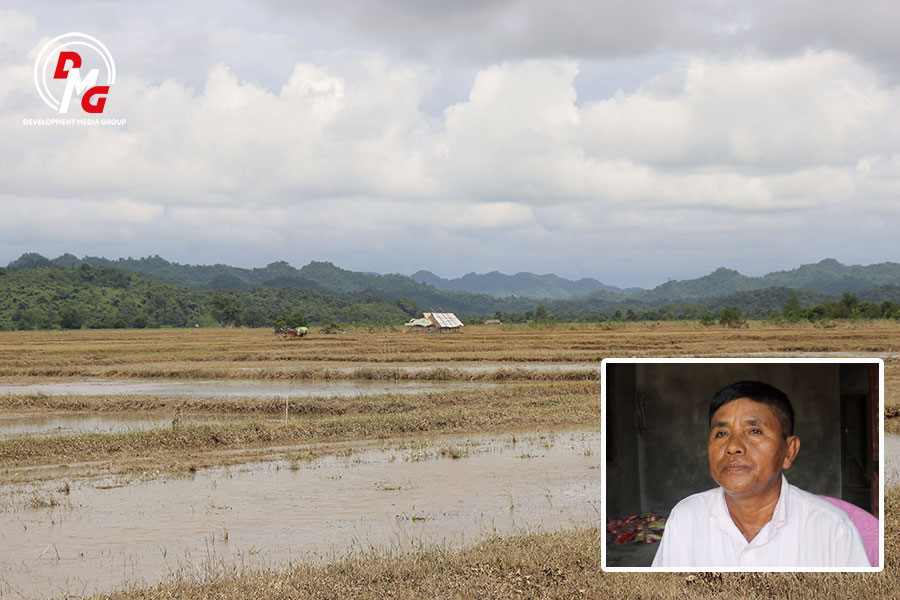- Arakan residents call for air raid warning systems amid surge in junta airstrikes
- Arakan’s Breathing Space (or) Mizoram–Arakan Trade and Business
- Death toll rises to 18 after junta airstrike on Ponnagyun village market
- Regime arrests dozens of Muslims in Sittwe over alleged Arakan Army links
- Over 200 IDPs in Ponnagyun struggle without shelter, food aid
Interview: 'This is a time when farmers need help'
DMG interviewed U Maung Thein Hla, secretary of the Danyawaddy agricultural association, about the difficulties and needs of the flood-affected farmers as well as the food security conditions facing local populations next year.
21 Aug 2024

DMG Newsroom
Thousands of acres of paddy fields were destroyed this month by floods in Arakan State's Kyauktaw, Mrauk-U and Minbya townships.
Farmers say they still have time to replant their paddy fields, but face high costs for new paddy seeds, fertiliser, fuel and other expenses that will likely prove prohibitive for many.
DMG interviewed U Maung Thein Hla, secretary of the Danyawaddy agricultural association, about the difficulties and needs of the flood-affected farmers as well as the food security conditions facing local populations next year.
DMG: Please tell us about the conditions of the paddy acreage damaged by recent floods.
U Maung Thein Hla: About 95 percent of the paddy planned to be grown has already been planted. At that time, there was a flood and thousands of paddy fields were destroyed by floods. The floodwaters from the Yan Creek east of the road from Mrauk-U to Kyauktaw Town were so strong that even the fields and villages were submerged. When the flooding contains a lot of mud, not clear water, it covers the paddy plants, and the paddy plants die quickly. When the water comes, the paddy plants end up in bad condition.
DMG: How much damage did the farmers suffer due to the floods?
U Maung Thein Hla: Many farmers said that the paddy fields they had worked so hard to cultivate were destroyed and that it was no longer possible to replant them. Some farmers said that they would replant paddy. It is no longer possible for the affected paddy to recover 100 percent. Due to the floods, paddy will be reduced from the original acreage.
DMG: What difficulties are faced by the farmers affected by the flooding?
U Maung Thein Hla: Farmers are in an uncertain situation to be able to replant the paddy. There is still time for farmers. If farmers replant the paddy - if they can bear the costs of seed and fuel and other costs - there is still a chance of success. But not every farmer can replant the paddy.
Farmers have set everything else aside to cultivate. Due to the loss of these [paddy acres], some farmers have lost the will to work and have many emotional feelings. This is a time when farmers need help.
DMG: Tell us about the monsoon paddy cultivation situation in Arakan State this year prior to the floods.
U Maung Thein Hla: This year, farmers have had difficulty buying fertiliser and fuel. The [market] price of paddy is extremely low. It can be roughly estimated that the paddy acreage has decreased by half.
DMG: Why is the acreage of paddy fields decreasing?
U Maung Thein Hla: Farmers have to sell the paddy that they planted last year for about K1.2 million per 100 baskets. A farmer who cultivates 10 acres of paddy may be able to sell the 10 acres of grain for inputs, but he is in a position where he can't expect to do the rest because he only gets back the cost of fuel.
The price of fertiliser has risen to K300,000 per bag and the price for one barrel of fuel is around K3 million. As the value of agricultural inputs is much higher than the value of the paddy in the fields, farmers are not able to grow rice in full.
DMG: When the paddy acreage had already been reduced, the paddy fields were damaged by the flooding, so what are the effects?
U Maung Thein Hla: This year's planting situation and meeting the consumption of people in Arakan State is a challenge. Arakan State is a region that grows only one crop per season. Farmers in Arakan State do not grow summer paddy or winter paddy. If the farmers can't plant the monsoon paddy, next year's consumption will be greatly affected.
DMG: What else would you like to say?
U Maung Thein Hla: If farmers fail to grow paddy well this year, it may affect their food security next year. Now is the time to replant paddy. There is still time to plant rice on the remaining acres. That's why it is necessary for associations and farmers' leaders to cooperate with CSOs [civil society organisations] and companies to help farmers.
The next year's issue of food security is not only the responsibility of farmers, but it is a national responsibility that requires cooperation. Farmers are not doing well this year, so I would like to ask the concerned officials to help farmers.







.jpg)












